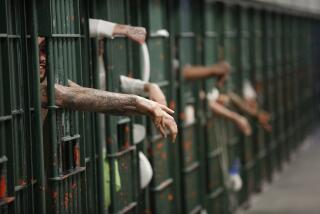Reputed Mobster Convicted on Counterfeiting Charges
- Share via
After years of trying, federal authorities succeeded in pinning a crime on reputed mobster Jack Catain on Friday, when a Los Angeles federal court jury found the Tarzana businessman guilty of conspiring to sell part of a $3.3-million cache of counterfeit $100 bills.
Jurors deliberated five hours after a three-day trial before finding Catain, 56, guilty of plotting with co-conspirators to peddle the phony cash and of selling $50,000 in counterfeit $100 bills. He was acquitted on a third charge of passing two $100 bills offered as samples.
The government has linked Catain, son of a Chicago produce market worker who once headed a Westwood-based company with sales of $100 million a year and a listing on the American Stock Exchange, to Mafia families in Chicago and Philadelphia.
Besides counterfeiting, law enforcement agencies suspect that during the last decade Catain has also engaged in money laundering, extortion and trading in stolen securities.
Catain insists that he is not a member of organized crime. He portrays himself as a victim of the government’s efforts to justify its intense, years-long interest in him. After his conviction Friday, he accused investigators of “dirty tricks.”
“I just had nothing to do with it,” he said. “Maybe I should have taken the stand.”
Witnesses Called ‘Liars’
His attorney, James A. Twitty, accused the prosecution of relying on the testimony of “liars,” who would have faced additional prison time of from five to 20 years if they had not testified for the government.
The witnesses, Stuart S. Noble, Richard Clark, Alan Kent and Stanley N. Sarubbe, all agreed to testify in exchange for parole or reduced prison time.
Noble, 41, who described himself as Catain’s cousin by marriage, testified that he manufactured millions in counterfeit dollars in 1981 and had them in storage until late 1984 when he talked to Sarubbe about selling and distributing them.
Facing a 12-year prison term on an earlier counterfeiting conviction, Noble said he later spoke to Catain about distributing the counterfeit cache in January, 1985. Catain demanded his share and agreed “to keep Sarubbe in line,” he testified.
Noble, who bargained with the government for reduction of his sentence to a total of four years, said he recruited a friend, Richard Clark, 49, a trade show producer, to keep the counterfeit money while Noble was in prison, to dole it out to Sarubbe and to distribute any profits from its sale to himself, Clark, Sarubbe and Catain.
“Jack did not want to come forward and get involved in any distribution,” Noble said.
Another unindicted co-conspirator, Alan Kent, a cruise director, testified that he bought $50,000 in counterfeit bills from Sarubbe for $10,000 and was subsequently arrested aboard a ship outside Los Angeles Harbor.
Both Clark and Sarubbe testified that after the sale of counterfeit bills to Kent, they met at Catain’s office over a flower shop in the San Fernando Valley and argued about the way the deal was handled. Sarubbe testified that he told Catain at that time that he wanted out of the counterfeiting deal, but Catain told him to finish it.
On that occasion, Clark said he paid Catain $7,500. But, he testified that the money was for the repayment of a loan from Catain and was not proceeds from the sale of counterfeit bills.
As part of his deal with the government, Noble said he had intermediaries turn over to Secret Service agents about $3.3 million in counterfeit money that had been stored in a large trunk, displayed to jurors during Catain’s trial.
‘Silent Godfather’
Juror Dolores DeBord of San Luis Obispo said after the guilty verdicts were returned that she and fellow jury members felt Catain “had knowledge and was involved,” even though his role may have been “minor.” She described Catain as a kind of “silent godfather.”
“The main thing is he opened his office for those men. . . .,” she said. “They had numerous meetings there. If he was not involved, why were these men in his office? It was never brought out why they were there.”
Prosecutor Edwin J. Gale, head of the U.S. Department of Justice Organized Crime Task Force in Los Angeles, said he was “very pleased” by Catain’s conviction, in part, because it showed that “Catain is and has been capable of withstanding the rigors of trial.”
“We therefore look forward to prosecuting him relative to his participation in an earlier major counterfeiting conspiracy for which he was indicted in 1982,” he said.
Catain was indicted then on charges of conspiring to distribute $1.5 million in counterfeit notes. He also was accused of accepting $50,000 from an undercover Secret Service agent as payment for future delivery of counterfeit notes.
Never Went to Trial
But Catain never went to trial on the charge. After two major surgeries, two heart attacks and a diagnosis that he is suffering from terminal heart disease, U.S. District Judge William P. Gray dismissed the case against Catain for health reasons in April.
However, the dismissal was appealed by the government to the 9th U.S. Circuit Court of Appeals, which remanded it to Gray for reconsideration. Gale said he hopes the judge will agree to bring Catain to trial on the first indictment.
Two weeks after Gray’s dismissal of the first indictment, however, the government again indicted Catain in a second counterfeiting case, which resulted in his conviction Friday. Twitty said he plans to appeal.
More to Read
Sign up for Essential California
The most important California stories and recommendations in your inbox every morning.
You may occasionally receive promotional content from the Los Angeles Times.













